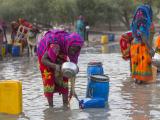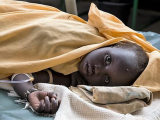The World Health Organization (WHO) and UNICEF announced over the weekend that Yemen's current cholera outbreak is the world's worst, with a total of 200,000 suspected cases and an average of 5,000 new cases being reported each day. In 2 months' time, there have already been 1,300 deaths. Cholera has now been reported in almost all of Yemen's governorates.
By calling the outbreak the "world's worst" UNICEF and WHO hope to speed international aid efforts to the war-torn country.
"This deadly cholera outbreak is the direct consequence of two years of heavy conflict," said a press statement from UNICEF. "Collapsing health, water and sanitation systems have cut off 14.5 million people from regular access to clean water and sanitation, increasing the ability of the disease to spread."
In addition to a lack of public health infrastructure, UNICEF estimated that 30,000 dedicated local health workers who play the largest role in ending this outbreak have not been paid their salaries for nearly 10 months.
"We urge all authorities inside the country to pay these salaries and, above all, we call on all parties to end this devastating conflict," UNICEF said.
Yemen's 'war zones' are breeding grounds for outbreaks
Though the current outbreak, which began in late April, is the worst in Yemen's history, the country has been battling cholera on and off for 2 years. In October of 2016, WHO released $1 million in emergency funds to help prevent an outbreak, but that money did little to address the cracks in the country's healthcare system.
Nearly 25% of the current cholera victims are children, and the cases are accelerating. On Jun 7, there were 100,000 cases reported, a number that's doubled in only 2 weeks.
On Jun 8, the WHO said that at least $66.7 million is needed over the next 6 months to establish oral hydration stations, provide chlorinated drinking water, and rebuild sanitation infrastructure.
See also:
Jun 24 UNICEF press release
Jun 7 CIDRAP News scan



















